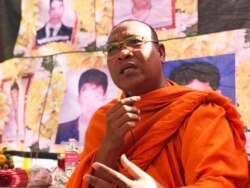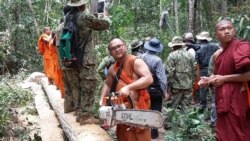Prominent activist Bor Bet was an active participant in protests that followed the arrest of unionist Rong Chhun. Dozens of youth and environmental activists protested on the streets of Phnom Penh demanding his release.
The government and local law enforcement viewed these protests as a threat to the taped-together “stability” they had maintained since the last major protests in 2013 and 2014. Since August, a number of these activists were arrested, charged, and sent to pre-trial detention.
Among them was Koet Saray, an activist monk from Battambang. The monk, who was part of the Khmer Thavrak activist group, was defrocked and remanded to pre-trial detention in early September. The defrocking of Koet Saray was the final straw for Bor Bet.
“If I stayed in the country, my fortune would not be different from that of Venerable Koet Saray who joined the protest to support and demand the release of Rong Chhun,” he told VOA Khmer in a recent interview.
“I don’t want to be arrested and, especially, I don’t want to be defrocked.”
Koet Saray and another monk, Sim Sovandy, first went into hiding at a remote pagoda in the northern province of Oddar Meanchey. After a few months, the chief monk of the pagoda had bad news; they were going to be arrested. On November 17, Bor Bet and Sim Sovandy crossed into Thailand seeking refuge.
Suspicious Invitation
Days after protesting Rong Chhun’s arrest on July 31, Bor Bet received an invitation asking him and other monks at the Broyuvong Pagoda in Phnom Penh’s Chamkarmon district to attend a meeting with the local monk council on August 5.
Bor Bet was immediately suspicious. He had seen similar invitations by the monk council before and they did not end well for the summoned individual.
In June, another activist monk Venerable Luon Sovath was summoned to a meeting with the Siem Reap monk council. He was being accused of having intimate relations with four women – a mother and three daughters – and was going to be defrocked.
Luon Sovath too fled the country, after the government charged him with the alleged rape, and is seeking asylum in Switzerland.
But Buntenh, who was part of the Independent Monk Network for Social Justice, has faced frequent threats and has gone into hiding multiple times. He was charged with alleged embezzlement for managing the funeral fund of slain political commentator Kem Ley. He then left the country and is currently in the United States.
“They called all the monks for the meeting because they knew I would realize [what was happening] and I would flee if they only called me,” he said.
“But they actually wanted to arrest and defrock me. I was told by others about this.”
Bor Bet said he was informed that local authorities were working to smear his reputation as an activist monk and question his participation in social justice activism.
Venerable Khim Sorn, Phnom Penh’s chief monk, said the invitation letter to monks at Broyuvong Pagoda was for a routine meeting and to get their views about the people living around the premises.
The chief monk instead claimed that Bor Bet wanted to live overseas and any accusations of defrocking the exiled monk were untrue.
“Maybe the monk wants to live overseas; that’s why [he] just exaggerates information,” Khim Sorn said.
Khim Sorn said monks were not allowed to participate in protests and if they violated this stricture they should leave the monkhood and continue their demonstrations as ordinary citizens.
Khieu Sopheak, a spokesperson for the Interior Ministry, said he could not confirm if Bor Bet or Sim Sovandy were wanted by law enforcement officials and that they would face legal trouble only if they participated in “illegal protests.”
“You can ask the Venerable whether he participated in any illegal demonstration?” Khieu Sopheak said. “The authorities only arrest people who commit something wrong.”
Environmentally Aware
Bor Bet, one of five siblings, grew up in the then-lush forests of the Kampong Thom’s Prey Lang Wildlife Sanctuary. The forested area was an early inspiration for the monk, who would later advocate for saving Cambodia’s fast-disappearing woodlands.
“I was born and grew up in the forests. Our forests are lost and I feel regret,” he said.
After some of his contemporaries joined the local pagoda, Bor Bet also decided to become a monk because he thought they looked “nice in monk robes.”
The monk graduated with dual degrees in sociology and law and went on to do a Master’s in Public Administration. Very quickly, the monk realized there was little value to his education and ecclesiastical learnings if he didn’t use it to help people.
“If I just eat and stay in a pagoda without caring about the suppression of people and deforestation, I can’t do it. I feel the pain,” he said.
“In my head, I love a democratic society more than a communist regime.”
But these views and ambitions have had an impact on the monk and those around him.
Bor Bet’s mother, Ouk Phuon, 57, a farmer in Kampong Thom province, said she had not seen her son for five months and was concerned that they would never meet again.
She was worried about him when he was hiding in Cambodia, but feels some sense of relief now that he had left the country.
“He told me not to worry about him. But I am a bit relieved since he has fled. I am afraid that he will be mistreated,” she added.
Having been forced to live overseas, Bor Bet still wants to come back and serve the Cambodian people; even entertaining the idea of becoming a politician.
“I want to join politics. Maybe in the next 10 years, I can leave the monkhood and get involved in politics by joining any party which is democratic,” he said.
“I will return.”









